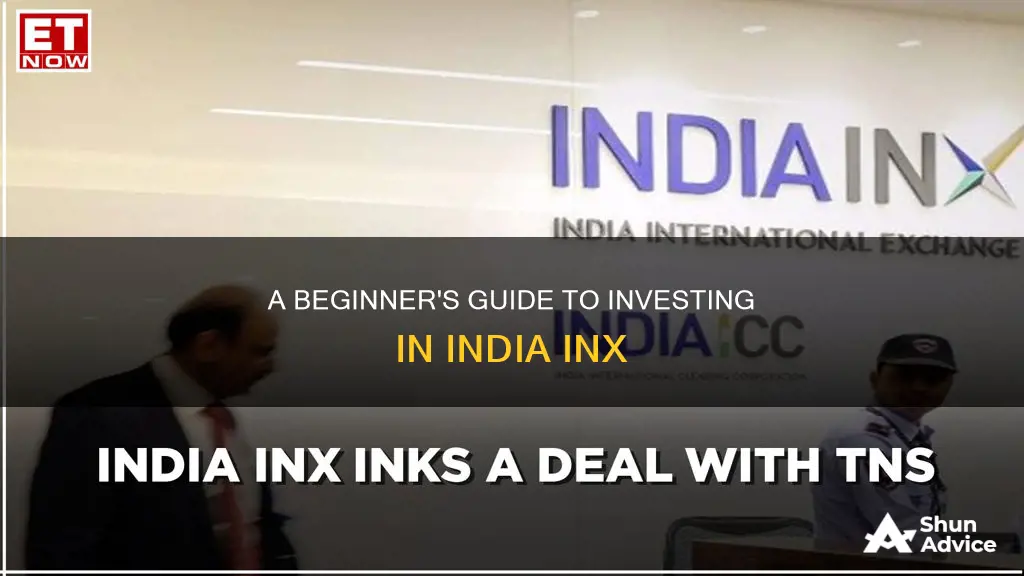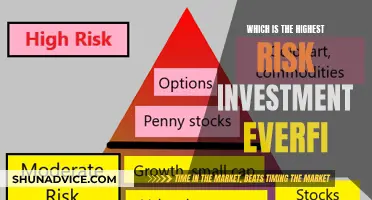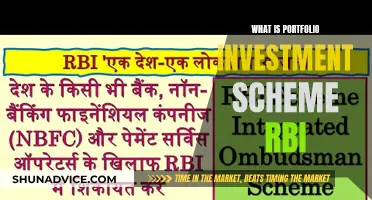
India INX is the country's first international exchange, owned by the BSE, which allows investors to invest in global stocks and diversify their portfolios. It offers 22-hour trading access, six days a week, to a wide range of products, including stock derivatives, commodity derivatives, currency derivatives, debt securities, and indexes. India INX is regulated by the International Financial Services Authority (IFSCA) and currently provides investors with access to 135 exchanges in 33 countries and 23 different currencies. To make foreign securities more accessible, India INX has established the India INX Global Access platform, which allows investors to route orders across multiple international exchanges. Under the Liberalized Remittance Scheme (LRS) of the Reserve Bank of India, resident Indians can invest up to $250,000 per year in foreign assets.
| Characteristics | Values |
|---|---|
| Type of exchange | The country's first international exchange |
| Owner | BSE |
| Trading access | 22-hour trading access, six days a week |
| Products | Stock derivatives, commodity derivatives, currency derivatives, debt securities, and indexes |
| Regulator | International Financial Services Authority (IFSCA) |
| Number of exchanges | 135 |
| Number of countries | 33 |
| Number of currencies | 23 |
| Investment limit | $250,000 per year under the Reserve Bank of India's LRS route |
| SPV | India INX Global Access |
What You'll Learn

India INX: the country's first international exchange
India International Exchange (IFSC) Limited, also known as India INX, is India's first international exchange. It was launched by the BSE (Bombay Stock Exchange) in January 2017 and is located at the International Financial Services Centre (IFSC) in Gujarat International Finance Tec-City (GIFT City).
India INX offers investors access to a wide range of products, including equity derivatives, currency derivatives, and commodity derivatives. It also provides investors with the opportunity to invest in global stocks and diversify their portfolios beyond domestic stocks. The exchange is regulated by the Securities and Exchange Board of India (SEBI) and offers several tax benefits to investors.
The India INX platform offers 22-hour trading access, six days a week, facilitating international investors and Non-Resident Indians to trade from anywhere in the world at their preferred time. It operates on EUREX T7, an advanced technology platform, and claims to be the world's fastest exchange, with a turn-around time of 4 microseconds.
To enhance the accessibility of foreign securities, India INX established a Special Purpose Vehicle (SPV) called India INX Global Access. This platform enables the routing of orders across multiple international exchanges, providing investors with a centralised platform for trading, clearing, settlements, and custodian services.
India INX has a market share of approximately 84% in the derivative trading segment and about 97% in the trading of listed debt securities. It has signed multiple Memorandums of Understanding (MoUs) with exchanges such as the Moscow Exchange, Dubai Gold and Commodities Exchange, and the London Stock Exchange Group, to offer a wider range of products and create new opportunities for investors.
Some of the key indices traded on India INX include the India INX 50, India INX Quality 30, India INX Midcap, India INX Bankex, and sector-specific indices like the India INX Gold, India INX Infrastructure Index, and India INX Pharma Index.
Investment Management: The Buy Side Advantage
You may want to see also

How to invest in global stocks
Investing in global stocks can be a great way to diversify your portfolio and tap into new markets. Here's a detailed guide on how to invest in global stocks, specifically focusing on India INX:
Understanding India INX
India International Exchange (India INX) is a global stock trading platform based in Gujarat's GIFT City. It is the country's first international exchange, allowing investors to invest in global stocks and providing domestic companies with opportunities to raise capital through the foreign debt market. India INX offers 22-hour trading access, six days a week, to various products such as stock derivatives, commodity derivatives, currency derivatives, debt securities, and indexes. It is regulated by the International Financial Services Authority (IFSCA).
Steps to Invest in Global Stocks through India INX:
- Open an Account: To start investing in global stocks through India INX, you will need to open an account on their platform. This typically involves submitting documents such as identity proof, address proof, tax ID proof, and bank statements. The account opening process may vary depending on the platform you choose.
- Understand the Regulations: Overseas investment by Indian residents is regulated by the Indian exchange control regulations. Ensure that you understand the Liberalized Remittance Scheme (LRS) guidelines and any restrictions that may apply to your investments.
- Choose Your Investment Type: India INX offers access to a wide range of investment products, including stocks, bonds, ETFs, and derivatives. Decide on the type of investment that aligns with your financial goals and risk tolerance.
- Select Your Investment Destination: India INX provides access to global stocks across various countries and exchanges. You can choose to invest in equities from the US, Japan, Canada, Australia, the UK, Europe, and more. Research the different markets and decide on the countries or regions you want to invest in.
- Convert Currency: Before investing, Indian residents need to convert their INR-based investment into US Dollars through registered brokers. Keep an eye on currency exchange rates as they can impact your investment value.
- Monitor and Manage Your Investments: Once you've made your investments, it's important to regularly monitor their performance and stay updated with global market trends. Remember that investing in global stocks comes with inherent risks, including market volatility and geopolitical events.
Additional Considerations:
- Tax Implications: Understand the tax regulations and requirements in both India and the countries you invest in. There may be taxes on capital gains, dividends, or other transactions.
- Brokerage Charges: Investing in global stocks typically involves brokerage charges and currency conversion fees. Ensure you are aware of all the costs associated with your investments.
- Risk Management: Investing in foreign markets carries risks, including currency exchange fluctuations and market volatility. Conduct thorough research and consider diversifying your investments across different sectors and industries to mitigate these risks.
- Compliance and Reporting: Familiarize yourself with any compliance and reporting requirements under the LRS and other relevant regulations. This includes disclosing your foreign investments in your income tax returns.
Savings to Investment: The Role of Financial Institutions
You may want to see also

India INX Global Access: a platform for routing orders
India INX Global Access is a pioneering venture – the first of its kind from India and GIFT IFSC to offer access to international exchanges and global markets for India-based investors under LRS, India INX’s members and their clients. It provides a single integrated terminal for trading on more than 130 exchanges across the globe, managing clearing and settlements as well as custodian services.
India INX Global Access IFSC Limited (India INX GA) acts as an Introducing broker, referring clients to multiple platform providers. Once referred, the client is responsible for any and all orders placed by them, and all orders are unsolicited and based on their own investment decisions. India INX GA does not provide investment advice or recommendations of any security, transaction, or order.
India INX Global Access offers zero account opening, annual charges, and custody charges, as well as low-cost PMS products. It also offers preferential remittance rates with partner banks. Brokerage fees start from USD 1 per executed order, with a subscription fee of USD 12 per year.
India INX Global Access provides a centralized platform to route orders to multiple international exchanges, eliminating the need for investors to register separately on each global exchange. This decreases the overall costs of accessing global markets from GIFT IFSC.
National Savings and Investments: A Secure Financial Future
You may want to see also

The Liberalized Remittance Scheme of RBI (LRS)
The Liberalized Remittance Scheme (LRS) of the Reserve Bank of India (RBI) allows resident individuals, including minors under the supervision of a legal guardian, to remit a certain amount of money each financial year to another country for investment and expenditure. The current limit is $250,000 per financial year, and there is no limit on the frequency of transactions. The money can be used for various purposes, including paying for overseas education, travel, medical treatment, gifts, donations, and maintenance of close relatives, among other things. It can also be invested in shares, debt instruments, and immovable properties in overseas markets. Individuals can also open, maintain, and hold foreign currency accounts with banks outside India under the scheme.
However, it's important to note that LRS restricts certain activities, such as buying and selling foreign exchange abroad or purchasing lottery tickets, sweep stakes, or proscribed magazines. It also prohibits remittances to countries identified by the Financial Action Task Force as "non-cooperative countries and territories". Additionally, there are rules around the sources of the money being remitted, with restrictions on funds from lottery winnings, specific company dividends, and certain types of income.
The LRS has made it easier for Indian residents to remit money abroad and has increased their investment opportunities by allowing them to buy property or shares in foreign markets. It is a legal requirement for resident Indians to comply with the LRS rules when sending money overseas, and all remittances must be declared properly using official forms and carried out through authorised dealers.
Comparing Portfolio Investments: Strategies for Success
You may want to see also

Overseas Portfolio Investment (OPI)
Under the old regulations, there was no clear distinction between OPI and ODI. OPI was also not explicitly defined, and under ODI, there was no specific mention of the percentage of equity holding required to qualify as ODI/OPI. This made it difficult for retail investors to determine whether their investment in foreign entities constituted ODI, requiring ODI compliance, or OPI.
The new regulations define OPI as an investment in a foreign company where the Indian entity owns less than 10% of the equity. If the Indian entity owns more than 10% in a listed entity or any amount of equity investment in an unlisted entity, it is considered ODI.
The new rules have widened the concept of overseas portfolio investment to include unlisted companies. They also allow Indian entities to invest up to 50% of their net worth in OPI and resident individuals to have wider access to investment in overseas entities within the limits of the Liberalised Remittance Scheme (LRS).
The LRS permits resident individuals, including minors under the supervision of a legal guardian, to invest up to $250,000 per year to acquire assets in foreign countries. This gives Indian investors greater flexibility and ease of doing business when it comes to overseas investments.
S-Corp Savings: Investing for Growth and Security
You may want to see also
Frequently asked questions
India INX is the country’s first international exchange, owned by the BSE, that allows investors to invest in global stocks and diversify their portfolios.
India INX is regulated by the International Financial Services Authority (IFSCA).
India INX offers 22-hour trading access, six days a week, to a wide range of products, including stock derivatives, commodity derivatives, currency derivatives, debt securities, and indexes.
Under the Liberalized Remittance Scheme of RBI (LRS), Indian residents, including minors with a legal guardian, can invest up to $250,000 per year to acquire assets in foreign countries.
Indian residents can open an overseas trading account with an Indian broker tied to international brokers or directly with a foreign broker with a presence in India. Examples of brokers include ICICI Direct, HDFC Securities, Kotak Securities, Axis Securities, Charles Schwab, Ameritrade, and Interactive Brokers.







